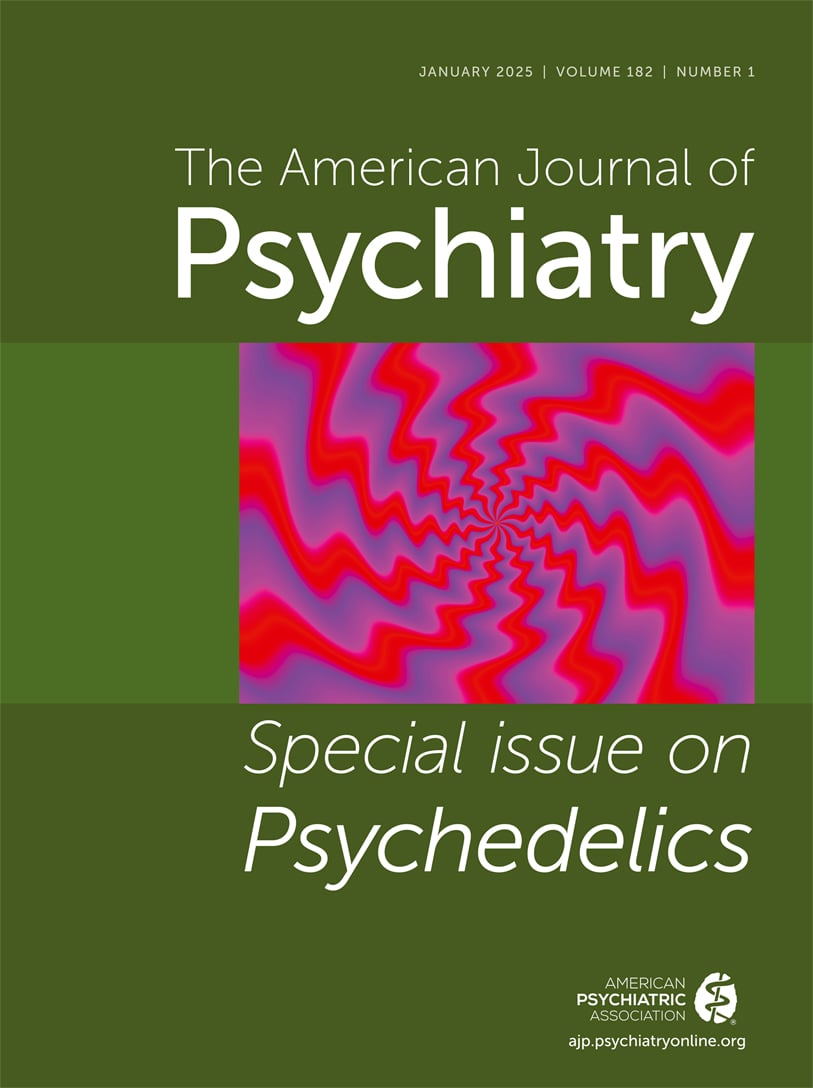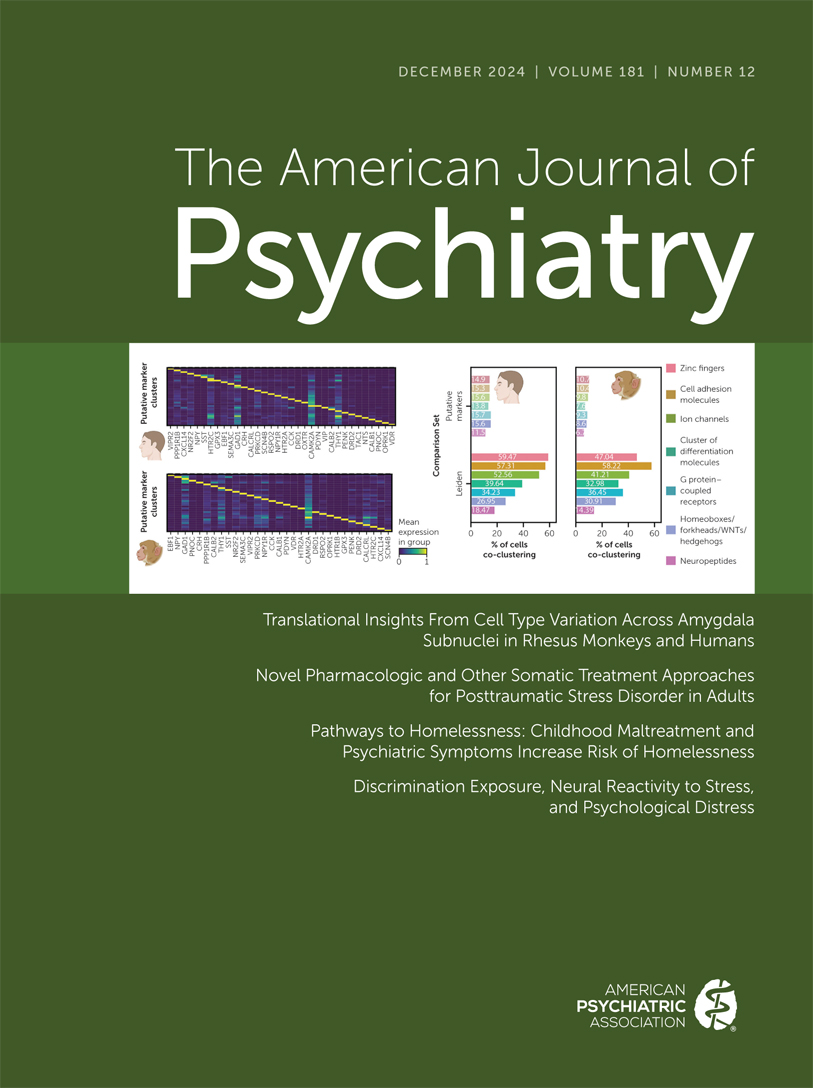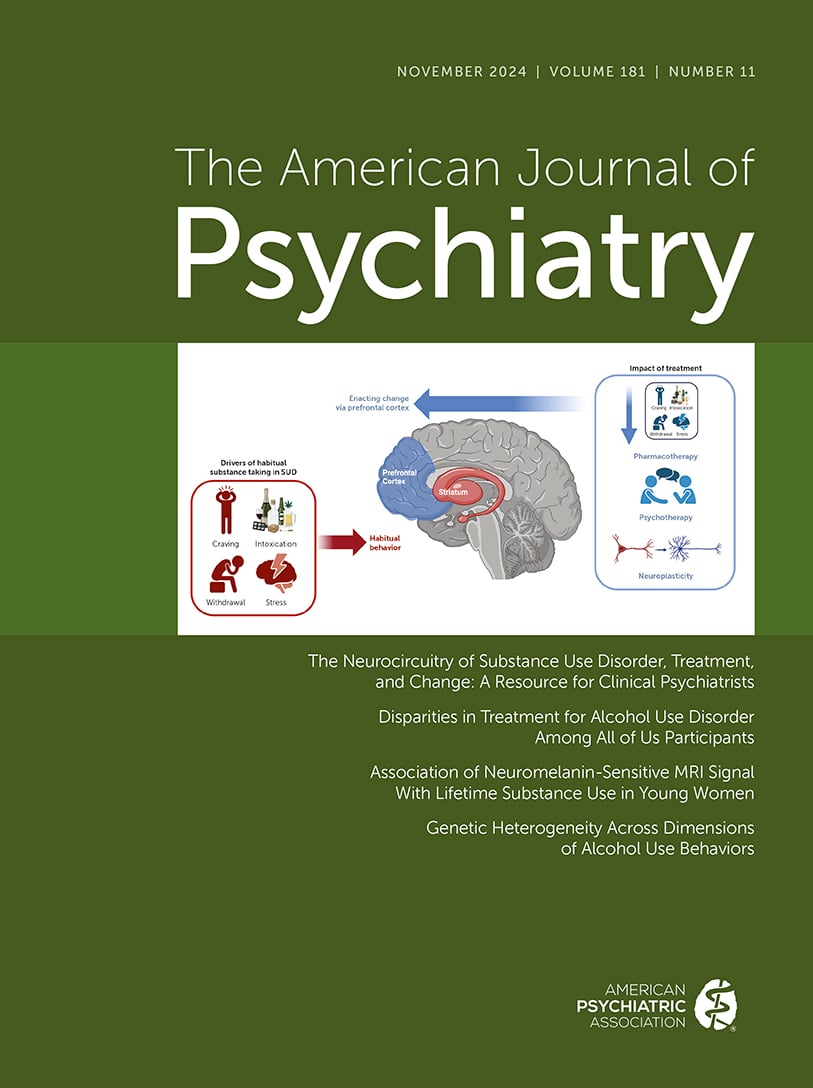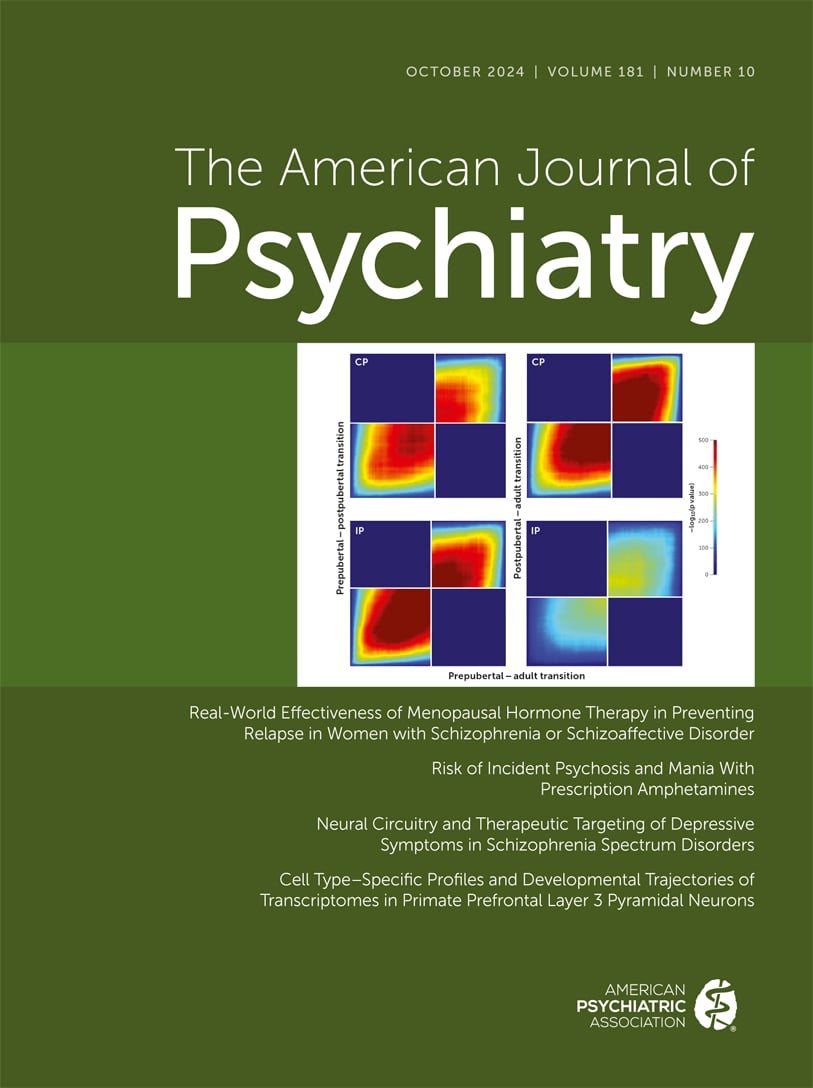American Journal of Psychiatry
- Volume 140
- Number 2
- February 1983
Overview: cerebrovascular accident and the hospitalized elderly--a multidimensional clinical problem
Publication date: 01 February 1983
Pages141–147A cerebrovascular accident is unwelcome at any age, but for the elderly it involves concerns. The abrupt onset of a cerebrovascular accident signals anew the already present fears of loss of control, death, insanity, disfigurement, loss of physical ...
https://doi.org/10.1176/ajp.140.2.141Publication date: 01 February 1983
Pages148–153Of 55 children admitted to a children's psychiatric service, 21 were homicidally aggressive. Psychiatric symptoms and diagnoses did not distinguish these children from the nonhomicidal children, but the homicidally aggressive children were significantly ...
https://doi.org/10.1176/ajp.140.2.148Publication date: 01 February 1983
Pages154–157In 102 children aged 6 to 12 years who were in a municipal psychiatric inpatient or outpatient clinic, the authors identified four groups of suicidal and/or assaultive behaviors. Logistic regression analyses showed that neurosis, intellectualization, and ...
https://doi.org/10.1176/ajp.140.2.154Publication date: 01 February 1983
Pages158–161Seventeen areas of psychosocial distress were evaluated in 87 university hospital internal medicine clinic patients by a self- administered questionnaire and a psychiatric interview. These patients' internists then predicted the patients' distress level ...
https://doi.org/10.1176/ajp.140.2.158Publication date: 01 February 1983
Pages162–166The author tested the hypothesis that a major depressive disorder contributes to a decline in social support by studying data from 331 subjects 65 years of age and older who had been selected at random from a larger community group and screened for a ...
https://doi.org/10.1176/ajp.140.2.162Publication date: 01 February 1983
Pages166–170This study relates inpatient-treated prevalence of the three mental illnesses most often requiring inpatient treatment--schizophrenia, alcoholism, and affective disorders--to social class in a suburban area. Rates were developed for the total population, ...
https://doi.org/10.1176/ajp.140.2.166Publication date: 01 February 1983
Pages171–175The authors present two reasons for reassessing familial transmission of schizophrenia: recent major changes in diagnostic criteria and methodological weaknesses of older studies. Their own study of this subject employed narrowly defined, operational ...
https://doi.org/10.1176/ajp.140.2.171Publication date: 01 February 1983
Pages176–180The wide use of DSM-III by clinicians and researchers in the United States has led to difficulties in reporting to federal agencies, which adhere to a policy supporting the use of ICD-9-CM. To rectify this situation, three federal agencies collaborated to ...
https://doi.org/10.1176/ajp.140.2.176Publication date: 01 February 1983
Pages180–184The authors compare patient characteristics in a psychiatric emergency setting in the United States with a similar service in the United Kingdom. They found that despite many significant differences in nonclinical variables, the severity of clinical ...
https://doi.org/10.1176/ajp.140.2.180Publication date: 01 February 1983
Pages184–188The participation of foreign medical graduates (FMGs) in American medicine is a longstanding phenomenon, yet the documentation of their role has been mainly impressionistic and anecdotal, particularly in psychiatry. Using the results of a survey on Board ...
https://doi.org/10.1176/ajp.140.2.184Publication date: 01 February 1983
Pages189–194In a 10-year follow-up of 45 alcoholic American Indians, 42 (93%) were located. Seven had been abstinent for 2 or more years, 26 still had drinking problems despite repeated treatment, and 9 had died. The authors hypothesize that the absence of stable ...
https://doi.org/10.1176/ajp.140.2.189Publication date: 01 February 1983
Pages195–197Psychiatrists have an ethical obligation to expose colleagues who sexually abuse their patients. However, this obligation often conflicts with the ethical obligation of confidentiality. The principled ethical dilemma is grounded in practical clinical ...
https://doi.org/10.1176/ajp.140.2.195Publication date: 01 February 1983
Pages200–202The evidence from the literature does not support the notion that psychotropic drugs with central anticholinergic properties (antiparkinsonian drugs, neuroleptics, antidepressants) constitute a risk factor in tardive dyskinesia. Antiparkinsonian drugs ...
https://doi.org/10.1176/ajp.140.2.200Publication date: 01 February 1983
Pages203–205The authors studied the cortisol response to 1 mg of dexamethasone in 10 patients who simultaneously manifested manic and depressive symptoms. All patients showed some evidence that normal cortisol suppression was lacking. When 3 patients were randomly ...
https://doi.org/10.1176/ajp.140.2.203Publication date: 01 February 1983
Pages205–207The author assessed 241 inpatients and outpatients on a neurology service for emotional disorders, using a systematic interviewing technique. DSM-III diagnoses were established in 101 of these patients (41.9%). The author presents a descriptive assessment ...
https://doi.org/10.1176/ajp.140.2.205Publication date: 01 February 1983
Pages208–211The ineffectiveness of antidepressants, and the effectiveness of neuroleptics alone, in the treatment of depressed schizophrenic patients is evidence that a pharmacologically definable depression cannot be demonstrated in schizophrenia. The author reports ...
https://doi.org/10.1176/ajp.140.2.208Publication date: 01 February 1983
Pages212–214Monitoring tricyclic antidepressant concentrations in the plasma of 43 patients with major depressive disorders indicated that some responded to imipramine or desipramine but not to amitriptyline or nortriptyline, or vice versa, even though plasma levels ...
https://doi.org/10.1176/ajp.140.2.212Publication date: 01 February 1983
Pages215–217Forty-six subjects with bipolar disorder and their relatives and friends were interviewed in depth about life events preceding the first and the latest episode of the subject's affective illness. Twenty years of age was the cutting point for dividing the ...
https://doi.org/10.1176/ajp.140.2.215Publication date: 01 February 1983
Pages218–221The authors describe two patients with organic psychosis who had vitamin B12 deficiency and no hematologic or spinal cord abnormalities. They review the literature that supports a causal relationship between B12 deficiency and cerebral dysfunction, as ...
https://doi.org/10.1176/ajp.140.2.218Publication date: 01 February 1983
Pages221–224The authors conducted quality review of outpatient psychopharmacological practice in 180 cases with the screening criteria of the APA Task Force on Psychopharmacological Criteria Development and a subset of 12 criteria involving higher-risk practices. ...
https://doi.org/10.1176/ajp.140.2.221Publication date: 01 February 1983
Pages225–228The authors questioned 52 recently admitted patients about formally receiving information regarding patients' rights and about their knowledge of that information. Of the 13 day hospital patients, 12 recalled being given the information, but only 20 of 39 ...
https://doi.org/10.1176/ajp.140.2.225Publication date: 01 February 1983
Pages229–232The authors studied the use of seclusion and restraint on an inpatient unit in a state psychiatric hospital. Of 69 randomly selected inpatients, 51% experienced seclusion or restraint at least once. More psychotic than nonpsychotic patients required ...
https://doi.org/10.1176/ajp.140.2.229Publication date: 01 February 1983
Pages233–235The authors rated 30 probands with senile dementia of the Alzheimer type and 30 healthy controls for depression at the beginning of a longitudinal study and 1 year later. Significant degrees of depression were not found in either group at either time.
https://doi.org/10.1176/ajp.140.2.233Publication date: 01 February 1983
Pages235–236Many patients with anorexia nervosa drink large quantities of beverages containing caffiene--e.g., coffee and diet cola--which have few calories and suppress the appetite while increasing energy. The author describes the clinical aspects of caffeinism in ...
https://doi.org/10.1176/ajp.140.2.235Publication date: 01 February 1983
Pages237–238The authors describe two HLA identical sibling pairs with panic disorder. To their knowledge, this is the first report of histocompatibility testing in patients with anxiety disorders.
https://doi.org/10.1176/ajp.140.2.237Publication date: 01 February 1983
Pages239–240The authors used reserpine to treat a case of tardive dyskinesia. Like neuroleptics, reserpine improved the symptoms of tardive dyskinesia during administration but appeared to aggravate the underlying illness, as evidenced by increased symptoms after ...
https://doi.org/10.1176/ajp.140.2.239Publication date: 01 February 1983
Pages241–242The authors successfully treated a chronically depressed man with a combination of desipramine and methylphenidate. Methylphenidate did not change his serum desipramine level, and the authors speculate that its ability to potentiate tricyclic ...
https://doi.org/10.1176/ajp.140.2.241Publication date: 01 February 1983
Pages243–244The authors describe a hypomanic-like reaction in a patient taking disulfiram and marijuana simultaneously and suggest there was an adverse interaction between the two drugs.
https://doi.org/10.1176/ajp.140.2.243Publication date: 01 February 1983
Pages245–247In contrast to a recently published report by Amsterdam and associates, the authors noted a higher frequency of abnormal dexamethasone suppression test results in 88 outpatients with primary depression (particularly the endogenous subtype) than in 49 ...
https://doi.org/10.1176/ajp.140.2.245Publication date: 01 February 1983
Pages247–249The authors present the case of a woman with bipolar disorder who developed reticulocytosis after two trials of carbamazepine. They urge that blood indices be carefully monitored whenever carbamazepine is used.
https://doi.org/10.1176/ajp.140.2.247Publication date: 01 February 1983
Pages249–251The authors describe three patients who developed withdrawal symptoms after discontinuation of antidepressants. Their symptoms were successfully treated with atropine. Central cholinergic overdrive is implicated in the genesis of the symptoms.
https://doi.org/10.1176/ajp.140.2.249Article
Article
Article
Article
Article
Article
Article
Publication date: 01 February 1983
Pages272-b–272In the November 1982 issue, at the bottom of page 1529, the list of members of the APA Task Force on Terrorism and Its Victims should have included the name of Robert I. Simon, M.D., who had a significant role in the preparation of the task force's ...
https://doi.org/10.1176/ajp.140.2.272-bPast Issues
View Issues Archive
Vol. 182 | No. 1

Vol. 181 | No. 12

Vol. 181 | No. 11
